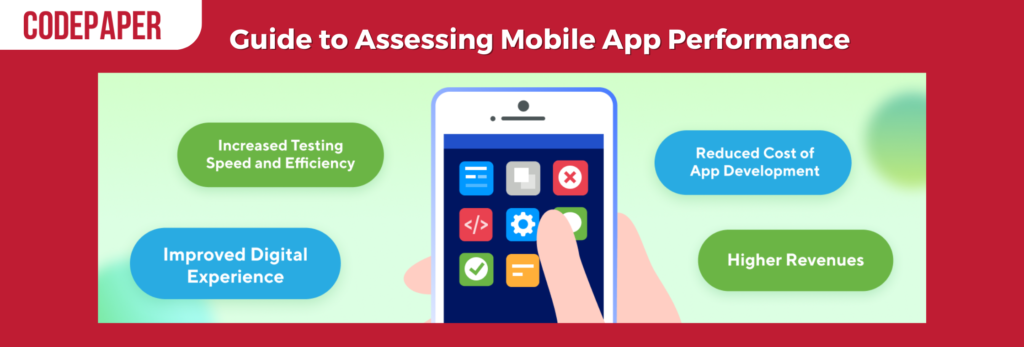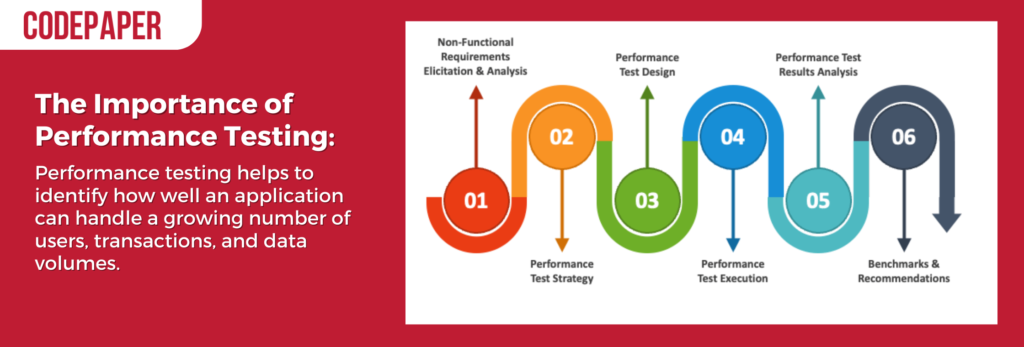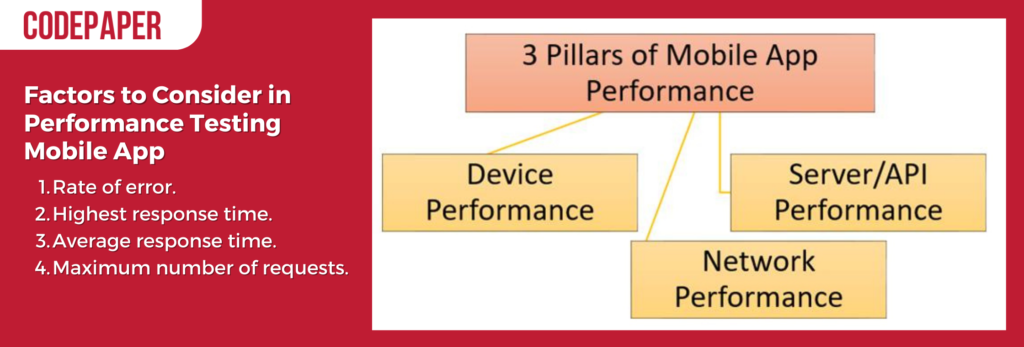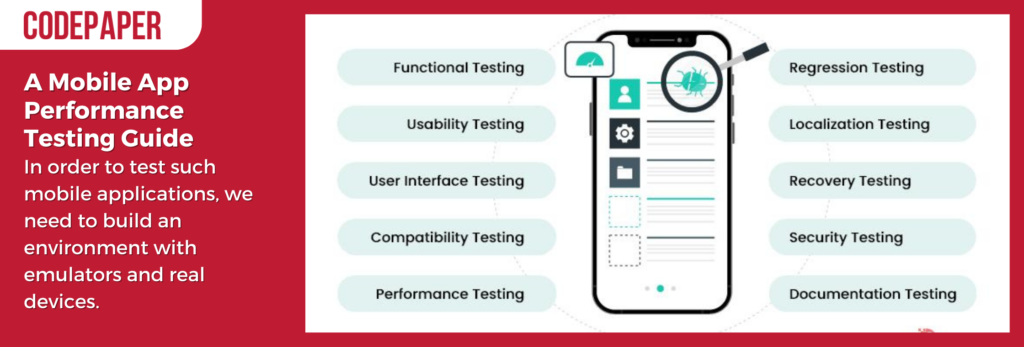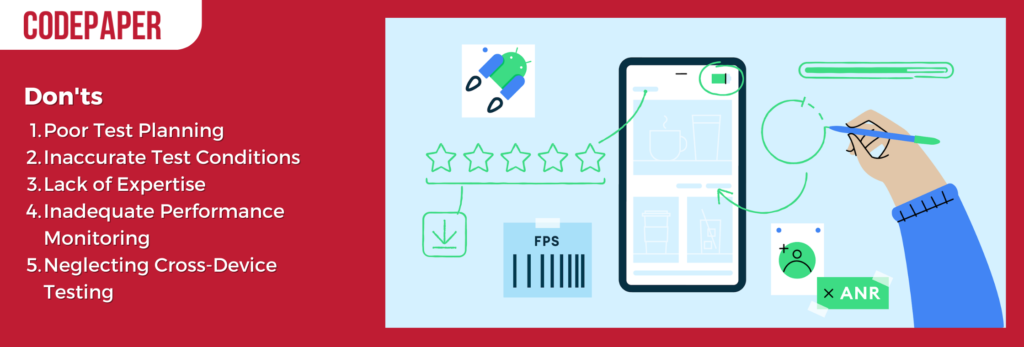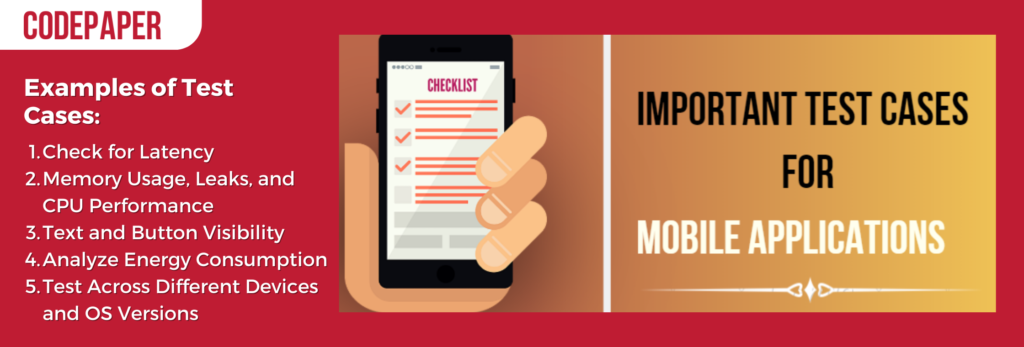In this article, we will delve into the process of testing the performance of a mobile app, aiming to enhance app downloads and improve customer engagement for clients.
At Codepaper, we understand that performance testing is essential to ensure consistent and reliable app performance, leading to positive user experiences. A slow and unresponsive app can deter users, making performance testing a critical step to eliminate issues like slow loading times, crashes, and freezing.
Load testing: Codepaper’s performance testing assesses app performance under both normal and high load conditions, ensuring that the mobile app can handle a significant number of users simultaneously and gauging its scalability.
Soak testing: We conduct soak testing to determine the app’s performance under prolonged usage and high traffic volumes, validating its ability to handle extended periods without any issues.
Stress testing: Our stress testing process pushes the app to extreme conditions, such as high data load and resource limitations, to identify vulnerabilities and limitations.
Spike testing: We test the app’s capability to handle sudden traffic spikes without disruptions, ensuring its resilience during peak usage periods.
Network Conditions: Codepaper’s performance testing ensures thorough testing of the app under various network conditions, including slow connections, to provide a comprehensive assessment of its performance.
User Interaction: Our performance test engineers meticulously check how users interact with the app, including buttons and input fields, to enhance code and improve the overall user experience.
Device Specifications: We understand the challenges posed by the multitude of device models in the market. Our rigorous performance testing guarantees optimization for different devices, avoiding performance discrepancies.
Battery Consumption: We conduct performance testing to identify excessive power consumption, ensuring users don’t uninstall the app due to battery drainage issues.
Battery Consumption: We conduct performance testing to identify excessive power consumption, ensuring users don’t uninstall the app due to battery drainage issues.
Identify Performance Metrics: Our expert team at Codepaper defines key performance metrics, such as response time and battery consumption, to focus testing efforts on essential aspects.
Set Performance Goals: We establish targets for each performance metric to ensure the app meets industry standards and exceeds user expectations.
Prepare Test Environment: At Codepaper, we create a test environment that closely simulates real-world conditions, encompassing different devices, networks, and usage patterns to obtain accurate and reliable results.
Execute Performance Tests: Our proficient team conducts tests manually or automatically using performance testing software, dedicating sufficient time for comprehensive testing (typically three to six weeks) to ensure thorough evaluation.
Analyze and Report Results: After completing performance testing, we analyze the results against established goals, identify areas for improvement, and provide clients with a detailed testing report.
Collaborate with the Development Team: At Codepaper, we believe collaboration is the key to successful app development. We involve the development team from the beginning, leveraging their insights and expertise to enhance the efficiency of the testing process.
Test Under Real-World Conditions: Our performance testing simulates real-world scenarios to uncover potential issues early and ensure a robust app that provides a seamless user experience.
Automate Performance Tests: We automate performance tests to improve efficiency, minimize errors, and enable scalability in our testing efforts.
Track the Process: Continuously monitoring app performance during and after testing allows us to promptly address any issues and maintain a positive user experience.
Continuously Optimize Performance: At Codepaper, we believe in consistently optimizing app performance throughout its lifecycle, attracting users and securing positive reviews.
Poor Test Planning: We understand that poor test planning can adversely impact the app’s potential success. Our well-structured and meticulous test planning ensures accurate results and a successful app launch.
Inaccurate Test Conditions: Testing only under ideal conditions can lead to unforeseen problems after app deployment. At Codepaper, we test the app in various real-world conditions to ensure comprehensive performance testing.
Lack of Expertise: Relying on inexperienced testers can result in crucial defects being overlooked. At Codepaper, our experienced performance testing engineers meticulously conduct tests to deliver a flawless app.
Inadequate Performance Monitoring: Inadequate monitoring can delay issue detection, negatively affecting the user experience, and leading to reduced user retention. At Codepaper, we prioritize continuous performance monitoring for optimal results.
Neglecting Cross-Device Testing: Neglecting to test the app on different devices and operating systems can limit its user base and potential success. Our cross-device testing ensures compatibility and maximizes the app’s reach.
Check for Latency: Codepaper’s performance testing involves using load-testing software and network monitoring tools to assess app latency and establish performance baselines for future tests.
Memory Usage, Leaks, and CPU Performance: Our team utilizes profiling tools to track and optimize memory usage, CPU performance, and identify potential leaks.
Text and Button Visibility: We engage our UI and UX designers to ensure an intuitive user interface that functions seamlessly on various devices.
Analyze Energy Consumption: Our automated tools identify and rectify energy-consuming aspects, ensuring app efficiency and user satisfaction.
Test Across Different Devices and OS Versions: At Codepaper, we rigorously verify app compatibility with various devices and operating systems to avoid device-specific issues and expand the app’s reach.
